Automate Customer Support Like a Pro With Smart AI

Automate customer support today by letting AI handle routine customer service tasks. Imagine a retail brand during a holiday rush: Sobot AI steps in to answer customer questions, process orders, and provide instant service across chat, voice, and social platforms. Many companies now see up to 30% higher customer satisfaction and free up 30% of their agents’ time with ai-powered customer service. Sobot’s chatbot provides support 24/7, understands customer needs in multiple languages, and helps agents deliver faster, more accurate service. Consider which customer support tasks in your business could benefit from automation right now.
Automate Customer Support Tasks
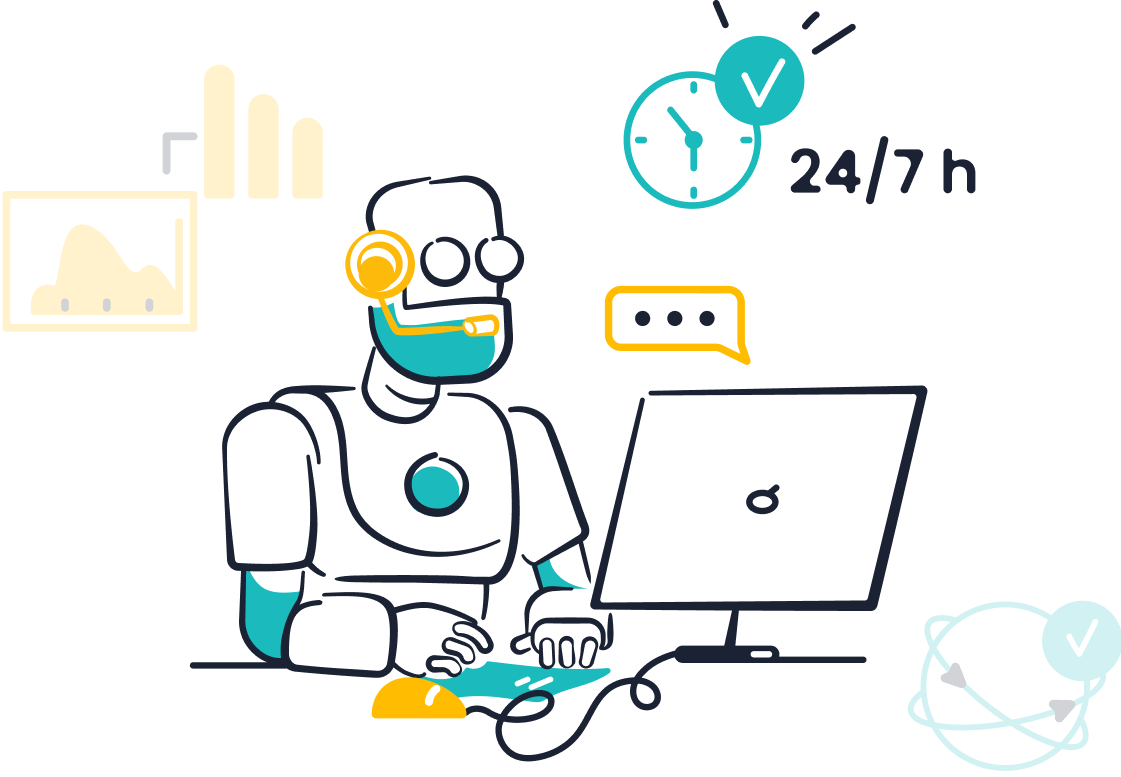
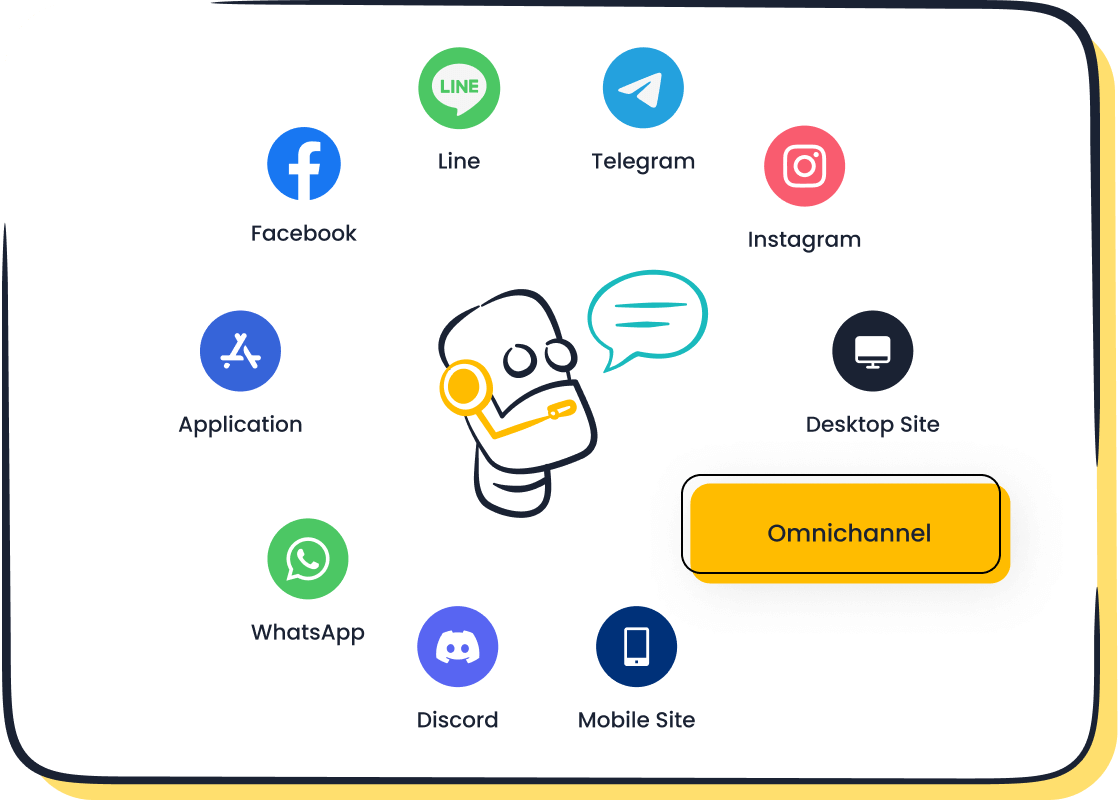
AI transforms customer support by automating repetitive and time-consuming tasks. Companies use AI to improve efficiency, reduce costs, and deliver better service. Sobot’s Chatbot and omnichannel solutions help businesses automate customer support across channels like chat, voice, email, and social media. Here are the main tasks that AI can automate in customer service:
Ticket Routing
AI-driven ticket routing assigns customer inquiries to the right agents or departments. This process uses AI tools to analyze the content of each request and match it with the best agent based on skills or workload. Companies see faster resolution times and fewer follow-up calls. For example, Telstra used AI-powered agent assist tools and saw a 20% drop in follow-up calls. Automation of Level 1 queries leads to 80% of these queries being handled instantly, which speeds up replies and reduces resolution times.
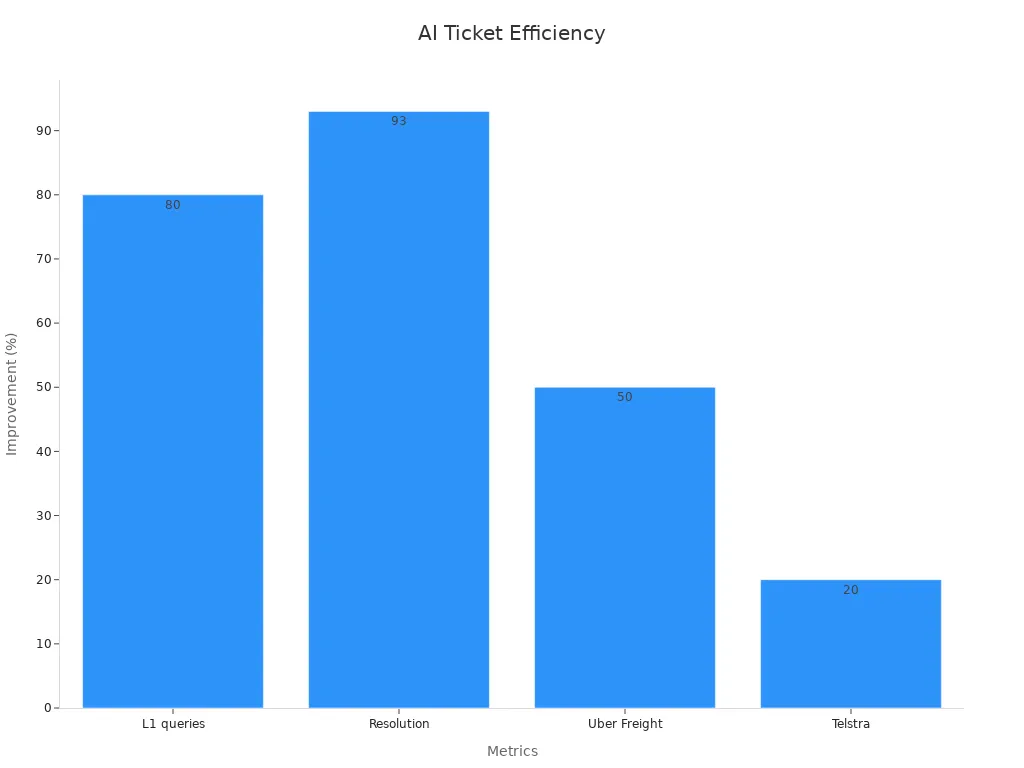
Sobot’s omnichannel platform uses AI to route tickets from chat, email, and voice channels, ensuring customers get help quickly. OPPO, a global smart device brand, used Sobot’s ticketing system to manage high volumes of customer support requests during peak shopping periods. This led to faster service and higher customer satisfaction.
FAQs and Self-Service
AI-powered FAQs and self-service portals let customers find answers without waiting for an agent. Sobot’s Chatbot uses a knowledge base built from articles, PDFs, and other sources to provide instant replies. This reduces the workload for agents and gives customers 24/7 access to information.
Companies like H&M and Rio have used AI to resolve up to 90% of pre-sales queries and 80% of repetitive questions without human intervention.
| Company | Challenge | AI Solution & Features | Key Numerical Results & Impact |
|---|---|---|---|
| H&M | Overwhelmed by repetitive queries during sales | AI live chat agent, multilingual, smart escalation | 80% queries resolved without humans; 30% annual cost reduction |
| Rio | Needed efficient support for Kickstarter launch | AI CX Assistant with rapid deployment, knowledge base | Saved $10,000/month; 90% pre-sales queries resolved by AI |
Sobot’s Chatbot helped OPPO automate responses to common questions, which improved efficiency and reduced maintenance efforts by 90%. Customers received quick answers, and agents could focus on complex issues.
Chatbots and Virtual Agents
Chatbots and virtual agents use AI to handle conversations with customers. These AI agents answer questions, guide users, and even help with purchases. Sobot’s Chatbot supports multiple languages and channels, making it easy for customers to get help anytime.
In the retail sector, Sephora’s chatbot increased sales conversions by 11% through personalized recommendations. LATAM Airlines reduced customer response times by 90% and resolved 80% of inquiries without human agents.
| Industry | Company | Operational Benefit(s) | Quantitative Result(s) |
|---|---|---|---|
| Retail & Ecommerce | Sephora | Increased sales conversions via personalized recommendations | 11% boost in conversions |
| Airlines | LATAM Airlines | Reduced customer response times and increased self-service | 90% reduction in response times; 80% inquiries resolved without human agents |
| Real Estate | Compass | Enhanced resolution speed and accuracy in customer support | 65% requests resolved in one interaction; 9% overall resolution rate increase |
Sobot’s Chatbot enabled OPPO to achieve an 83% chatbot resolution rate and a 94% positive feedback rate. This shows how AI in customer service can boost efficiency and satisfaction.
Sentiment Analysis
AI tools can analyze customer messages to detect emotions and attitudes. Sentiment analysis helps companies understand how customers feel about their service. This allows agents to respond with empathy and prioritize urgent cases.
Metrics like precision, recall, F1-score, and accuracy measure how well AI detects customer sentiment.
| Metric | Description | Role in Sentiment Analysis Effectiveness and Accuracy |
|---|---|---|
| Precision | Measures the proportion of true positive sentiment predictions among all positive predictions. | Indicates accuracy in identifying positive sentiments, minimizing false positives. |
| Recall | Measures the ability to capture all relevant sentiments, minimizing false negatives. | Ensures the model identifies most actual sentiments, avoiding missed insights. |
| F1-score | Harmonic mean of precision and recall, balancing both especially with uneven class distributions. | Provides a balanced metric when precision and recall trade-offs exist. |
| Accuracy | Overall correctness of sentiment predictions across all classes. | Reflects general model performance in correctly classifying sentiments. |
| AUC-ROC | Evaluates trade-off between sensitivity (true positive rate) and specificity (true negative rate). | Assesses model’s ability to distinguish positive from negative sentiments effectively. |
Sobot’s AI agents use sentiment analysis to monitor customer attitudes in real time. This helps companies deliver personalized interactions and improve customer satisfaction.
Voice and Multilingual Support
Voice and multilingual support systems use AI to help customers in their preferred language and channel. Sobot’s Chatbot supports multiple languages and operates 24/7. This ensures customers from different regions get the help they need.
- Gnani.ai’s Aura365 supports over 40 languages, showing the power of multilingual AI in global customer service.
- Voice AI automates compliance checks and quality assurance, reducing manual labor and costs.
- Infosys Cortex uses real-time sentiment analysis and proactive assistance to improve agent decision-making and reduce call handling times.
- Voice agents with Edge AI lower customer service costs and improve productivity.
- Edge AI processing reduces bandwidth and cloud resource usage, making operations more efficient.
- Enhanced customer experiences from these technologies increase retention and create upselling opportunities.
Sobot’s omnichannel platform allows customers to reach support through chat, voice, WhatsApp, and more. OPPO integrated Sobot’s solutions to connect global customer channels, which improved data accessibility and service quality.
AI in customer service helps companies automate customer support, reduce costs, and deliver better service. Sobot’s Chatbot and omnichannel solutions give businesses the tools they need to succeed in today’s fast-paced world.
Benefits of AI-Powered Customer Service
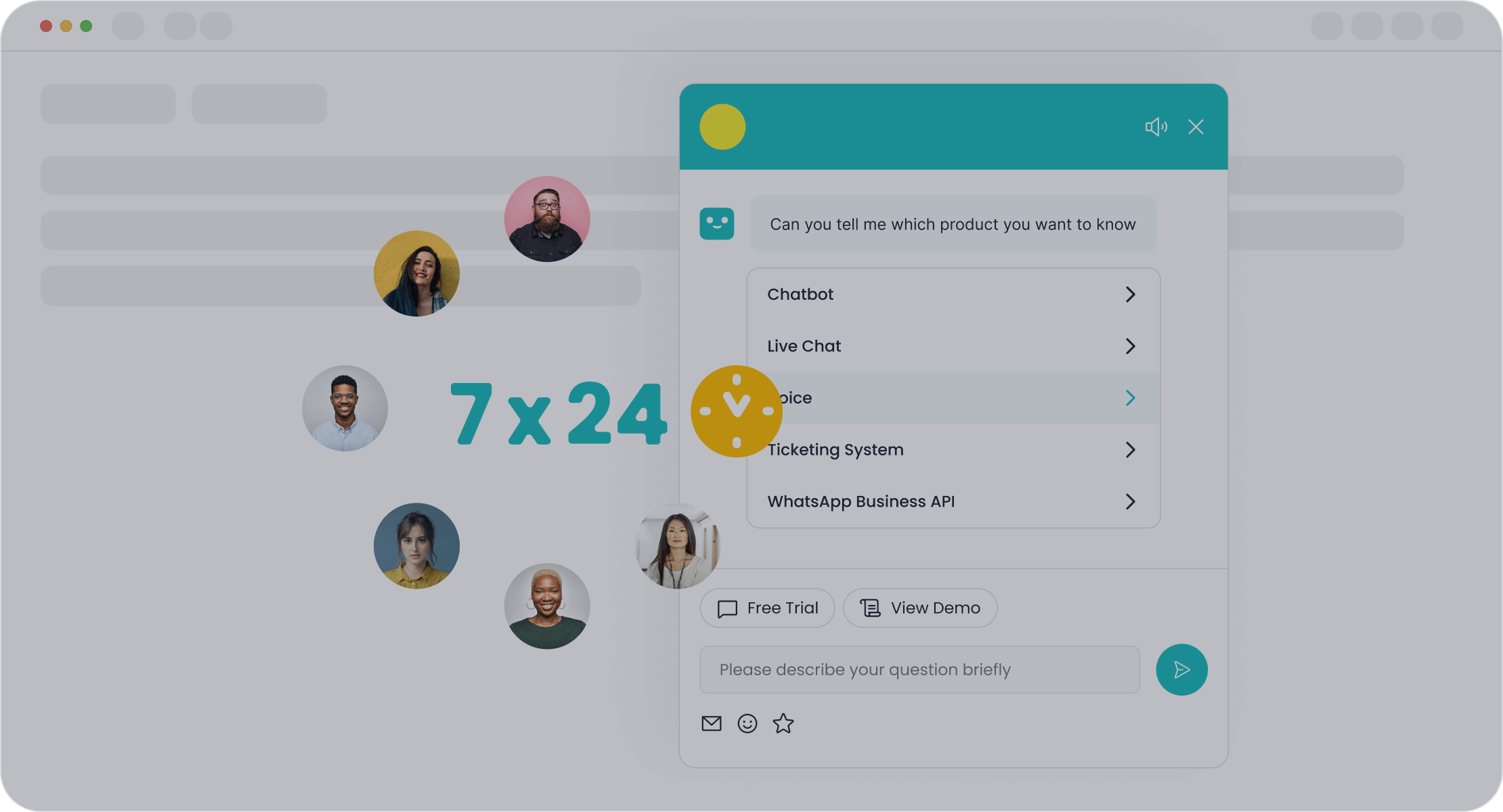
Faster Responses
AI-powered customer service delivers fast response times that keep customers happy. Companies using AI tools see up to a 52% increase in ticket resolution speed and a 37% drop in first response times. Sobot’s Chatbot helps agents answer questions quickly by handling routine requests and providing instant replies. This frees agents to focus on complex issues. The table below shows how AI improves support speed:
| Performance Metric | Improvement / Result | Description |
|---|---|---|
| Ticket resolution speed | 52% faster | AI automation helps resolve tickets much faster. |
| First response time | 37% reduction | AI reduces the wait for a first reply. |
| Average response time | Reduced from 6h to 70 mins | AI cuts down the time customers wait for answers. |
| Agent productivity | 13.8% more inquiries/hour | Agents handle more customer questions with AI support. |
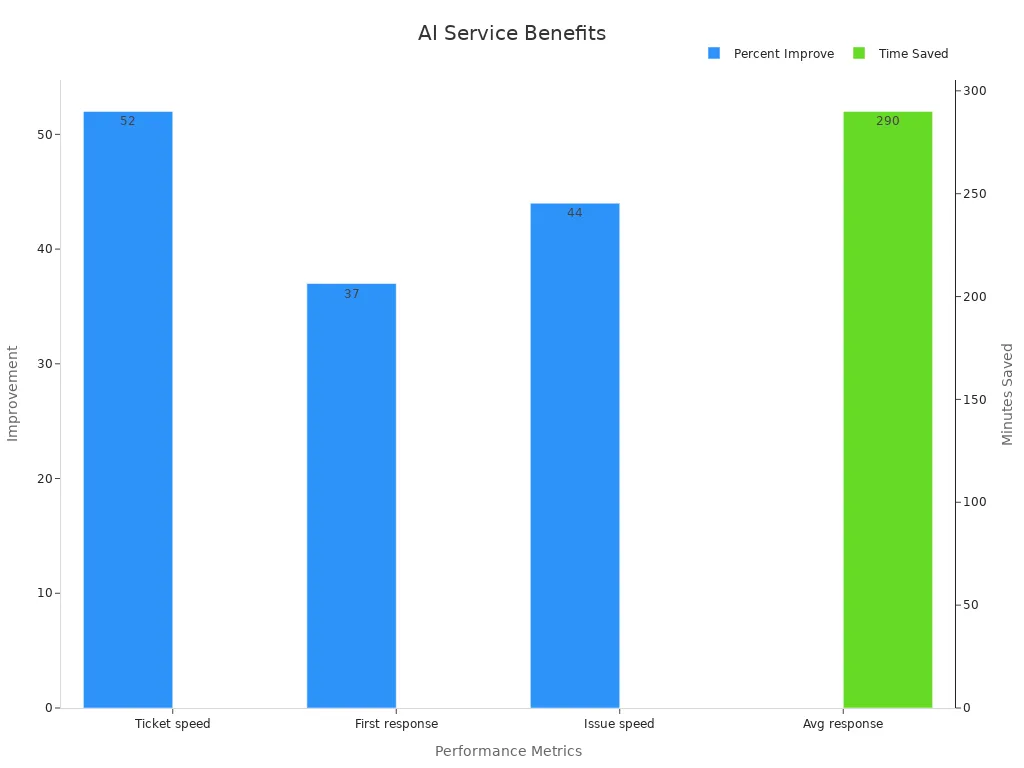
24/7 Availability
AI-powered customer service offers 24/7 availability, so customers get help any time. Sobot’s Chatbot works around the clock in multiple languages, making support accessible worldwide. Companies like Endeksa saw a 59% reduction in waiting times and a 138% increase in leads after adding AI-driven support. The table below highlights these improvements:
| Company | Numerical Improvements from 24/7 AI-Driven Support |
|---|---|
| Endeksa | 59% reduction in waiting times; 138% more leads; 10%+ increase in customer satisfaction |
| Suitor | Automated 85% of queries, making support more efficient and accessible |
| ING | More conversations handled and higher customer satisfaction |
Cost Savings
AI reduces costs by automating repetitive tasks and improving self-service rates. Sobot’s Chatbot helps companies save up to 50% on agent costs by handling routine questions. AI also summarizes conversations and prioritizes issues, saving time for both agents and customers. Many businesses report lower expenses and higher operational efficiency after adopting customer service AI.
- AI automates data entry and triaging, reducing labor costs.
- Automated chatbots and voice prompts resolve queries faster.
- Streamlined customer interactions boost productivity and satisfaction.
Customer Satisfaction
AI-powered customer service improves customer satisfaction by providing fast, accurate, and consistent support. A US telecom provider saw a 30% drop in complaints and a 15% rise in repeat orders after using AI. Sobot’s Chatbot helped OPPO reach a 94% positive feedback rate and an 83% chatbot resolution rate. AI ensures every customer gets the right help at the right time, which leads to better customer experience and loyalty.
Companies that use AI in customer support see higher satisfaction scores, better retention, and more positive feedback.
Implementing AI in Customer Service
Adopting AI in customer service requires a clear, step-by-step approach. Companies can follow these practical steps to ensure a smooth transition and maximize the benefits of AI in customer service.
Assess Needs
Businesses start by identifying their main customer support challenges. They use frameworks like the Impact and Feasibility Matrix or ROI assessment to prioritize which tasks to automate. Metrics such as cost savings, efficiency gains, and customer satisfaction scores help set clear goals. For example, a company may aim to reduce response times by 50% or automate 70% of FAQs. Sobot’s team helps clients analyze their current workflows and pinpoint the best opportunities for AI in customer service.
Choose the Right Tools
Selecting the right ai tools is crucial. Companies compare options based on functionality, integration capabilities, ease of use, and data security. Intelligent chatbots, natural language processing, and sentiment analysis are common choices. Sobot’s AI solutions offer omnichannel support, easy integration, and strong data protection. Businesses should also consider user reviews and compatibility with existing systems.
Integration Steps
Integration works best with a phased rollout. Teams connect ai tools to existing systems using APIs or middleware. Data cleaning and standardization come first, followed by testing under real-world conditions. Companies like Keller Williams and Shine have used modular integration to achieve measurable results, such as a 60% increase in engagement or $10 million in annual savings. Sobot’s technical team guides clients through each step, ensuring secure and compliant integration.
Training and Onboarding
Effective training ensures staff can work alongside ai tools. Companies track metrics like customer retention rate and time-to-completion to measure onboarding success. Real-time feedback and personalized training programs help teams adapt quickly. Sobot provides ongoing training and resources, making the transition to ai in customer service smooth and efficient.
Monitor and Optimize
Continuous monitoring keeps ai systems effective. Teams use dashboards to track accuracy, efficiency, and customer satisfaction. Regular updates and retraining address issues like model drift. Sobot offers analytics and optimization services, helping businesses maintain high performance and adapt to changing needs.
Companies using ai in customer service report up to a 30% increase in productivity, a 25% boost in customer satisfaction, and a 40% reduction in time spent on routine tasks. These results show the value of a structured approach to AI adoption.
Overcoming AI Challenges
Complex Queries
AI handles many routine tasks, but some customer questions need deeper understanding or special skills. Companies often use a mix of ai agents and human agents to solve these complex issues. This hybrid approach lets ai agents manage simple requests while agents focus on unique or sensitive problems. For example, Sobot’s platform allows seamless handoff between ai agents and human agents. This teamwork improves efficiency and reduces errors. Metrics like mean time to resolution (MTTR) show how quickly teams solve problems. When ai agents automate triage and routine fixes, agents can spend more time on important cases. Companies also use real-time alerts and automated reports to keep service levels high.
- Task allocation between ai agents and agents boosts efficiency.
- Flexibility in switching tasks helps teams adapt to changing needs.
- Trust scores and safety checks ensure reliable service.
Human Touch
Customers want fast answers, but they also value empathy and personal attention. AI agents handle repetitive questions, freeing agents to help with complex or emotional issues. Studies show that 86% of customers care more about human connection than quick replies. Many people prefer to talk to agents for urgent or sensitive matters. Sobot’s ai agents can detect when a customer needs extra care and transfer the chat to an agent. This balance creates better experiences and builds trust.
- 69% of customers want personal advice from agents for big purchases.
- 75% of people say empathy is important in customer support.
- Companies like MásMóvil increased conversions by 20% by blending ai and human support.
Data Privacy
Protecting customer data is a top priority for any ai system. Many people worry about how companies use their information. Sobot’s ai agents follow strict privacy rules, including GDPR compliance and data encryption. The platform uses real-time monitoring and consent management to keep data safe. Automated tools help detect risks and prevent unauthorized access. The table below shows how ai-driven compliance tools work in different industries:
| Category | Example Features |
|---|---|
| Compliance Statistics | 92% of organizations see the need for new AI risk-handling approaches |
| AI-Driven Compliance Tools | Automated data classification, real-time monitoring, consent management |
| Industry Applications | Healthcare: EHR monitoring; Finance: fraud detection; Retail: consent management |
| Ethical Steps | Privacy by design, audits, human-in-the-loop |
48% of users have stopped buying from companies due to privacy concerns. Companies must reassure customers that ai agents protect their data.
Change Management
Adopting ai in customer support means more than just adding new tools. Teams need training, clear communication, and ongoing support. Companies with strong change management see 52% higher adoption rates and 30% higher user satisfaction. Sobot offers training and resources to help agents learn new skills and use ai agents effectively. The chart below shows how good change management improves results:
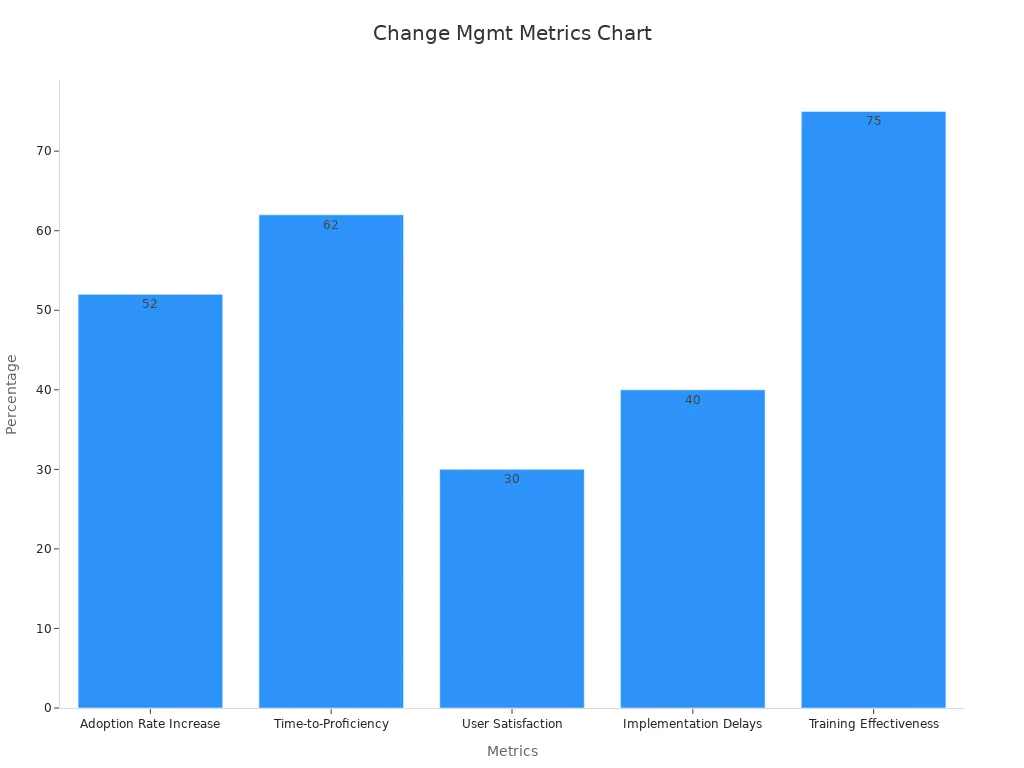
- Training and support help agents use advanced ai features.
- Ongoing support and leadership buy-in keep adoption rates high.
- Balanced teams reduce delays and improve return on investment.
Companies that invest in training and communication get better results from ai-powered customer support.
Measuring Customer Support Success
Tracking the right metrics helps companies see how well ai improves customer support. Sobot’s reporting and analytics features give teams real-time data to measure progress and make better decisions. Companies use several key performance indicators (KPIs) to evaluate ai in customer support.
Response Time
Response time measures how quickly ai agents answer customer questions. Fast response times lead to happier customers and better customer experience. Sobot’s ai tools show the average time from when a customer sends a message to when they get a reply. Companies also track system uptime and error rates to ensure reliable support. For example, Sobot’s platform maintains 99.99% uptime, so customers always get help when they need it. High throughput and low model latency mean more customers get answers faster.
Resolution Rate
Resolution rate shows the percentage of customer issues solved by ai without human help. A high rate means ai handles most questions, freeing agents for complex tasks. Sobot’s analytics dashboard tracks this metric across all channels. OPPO, a global smart device brand, reached an 83% chatbot resolution rate after using Sobot’s ai solutions. The table below highlights how different ai features improve resolution rates:
| Feature | Description | Impact on Resolution Rate |
|---|---|---|
| Intelligent Routing | Matches cases to skilled agents | Faster, more accurate resolutions |
| Self-Service Chatbots | Guides customers to answers | Fewer tickets, quicker solutions |
| Knowledge Mining | Summarizes key info for agents | Speeds up problem solving |
Satisfaction Scores
Customer satisfaction (CSAT) scores reflect how well ai meets customer needs. Companies collect these scores through surveys and sentiment analysis after each interaction. Sobot’s reporting tools help teams monitor CSAT and spot trends. OPPO achieved a 94% positive feedback rate with Sobot’s chatbot, showing strong customer approval. High satisfaction scores mean customers trust the ai and feel valued.
Cost Reduction
Cost reduction is a major benefit of ai in customer support. Companies save money by automating routine tasks and reducing the need for extra agents. Sobot’s analytics show up to 50% savings on agent costs. Research from McKinsey found that ai can increase issue resolution per hour by 14% and reduce handling time by 9% (source). These savings let companies invest more in improving customer experience.
Regularly tracking these KPIs helps companies get the most value from ai and deliver better customer support.
Businesses can automate customer support by following clear steps: assess needs, select the right AI tools, integrate solutions, train teams, and monitor results. Sobot’s AI-powered chatbot delivers 24/7 customer service, reduces costs, and improves satisfaction.
> 84% of leaders say AI is key for meeting customer support expectations. AI chatbots save billions of work hours and boost efficiency.
To start, teams should review current workflows or schedule a Sobot demo. Begin the journey to smarter customer support today.
FAQ
How can businesses automate customer support with Sobot?
Sobot provides AI-powered chatbots and omnichannel solutions. These tools automate customer support by handling routine questions, routing tickets, and offering 24/7 service. For example, OPPO used Sobot to achieve an 83% chatbot resolution rate and a 94% positive feedback rate.
Does Sobot’s chatbot require coding skills to set up?
No coding is needed. Sobot’s chatbot uses a point-and-click interface. Users can automate customer support tasks quickly. The setup process is simple and user-friendly, making it easy for teams to launch automation without technical expertise.
Can Sobot automate customer support in multiple languages?
Yes. Sobot’s chatbot supports multilingual interactions. It helps businesses automate customer support for global audiences. The system recognizes and responds in several languages, ensuring customers receive help in their preferred language.
What are the main benefits when companies automate customer support?
Companies see faster response times, lower costs, and higher customer satisfaction. Sobot’s clients report up to 50% savings on agent costs and a 30% increase in productivity. Automated customer support also provides 24/7 availability.
How does Sobot ensure data privacy in automated customer support?
Sobot follows strict data privacy standards. The platform uses GDPR-compliant processes, data encryption, and real-time monitoring. These features protect customer information and help businesses automate customer support securely.
Learn more about Sobot’s privacy features at Sobot’s official website.
See Also
Enhancing Customer Support Efficiency With AI Software Solutions
Transforming Customer Support Through AI Service Agents
Comprehensive Guide To AI Software For Call Centers
